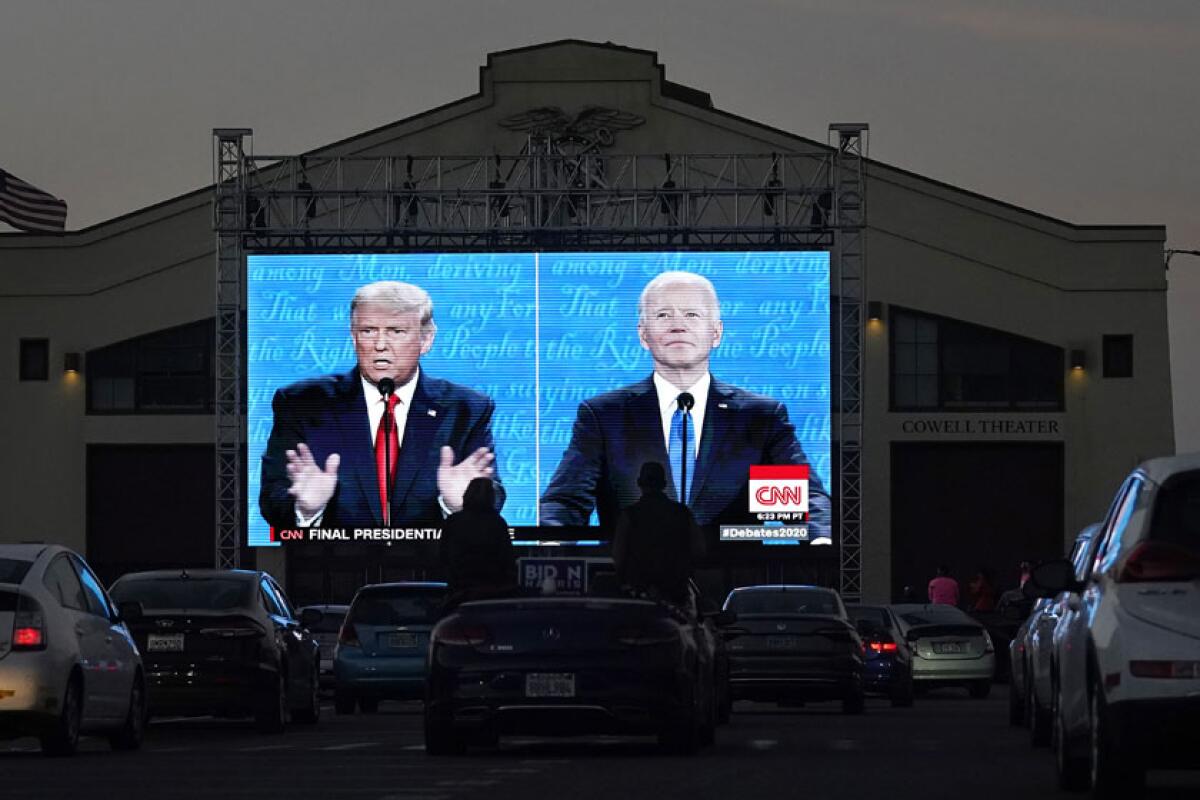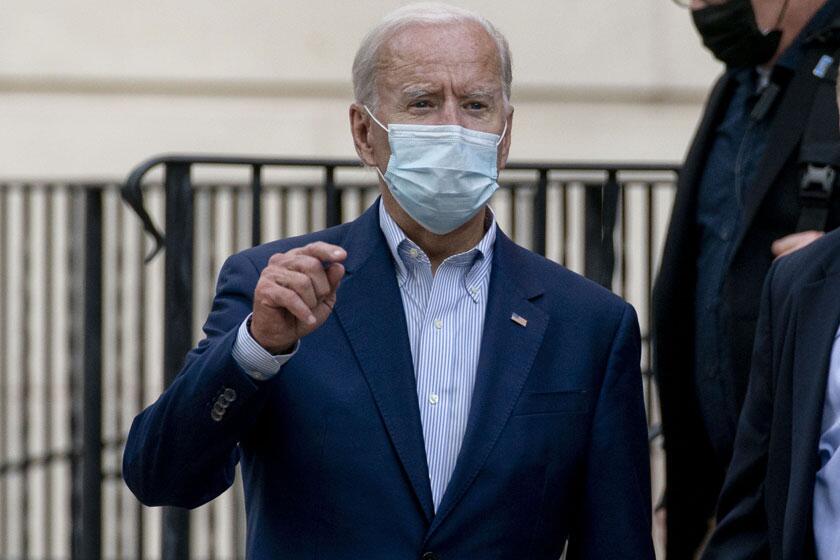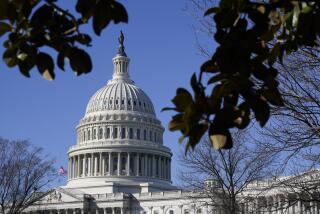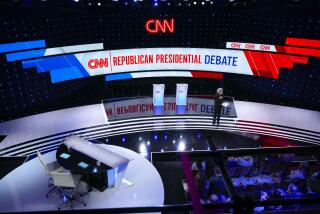Column: This year’s political ads: The good, the bad and the deceptive

The 2020 campaign is on track to break records: not only in votes cast, but also in money spent and television commercials aired.
More than 5 million campaign ads have appeared on screens already, over twice as many as in 2016. Spending on television and digital advertising is nearly $8 billion.
In Pennsylvania, Florida, North Carolina and other battleground states, television screens have been barraged with nonstop campaign ads for weeks. Now, as election day nears, campaigns are airing some spots nationwide, too.
Joe Biden is so flush with cash that he’s bought TV time during World Series baseball and NFL and college football games in a push to reach male voters, a group that polls show favors President Trump.
In the age of social media, it may seem odd that campaigns are relying so heavily on a medium that’s been around since 1952, when Republican nominee Dwight D. Eisenhower unveiled the first televised political ad.
Flashbacks to 2016’s presidential upset have Democrats fretting about the ways Donald Trump could still eke out a win over Joe Biden.
But strategists in both parties are convinced that television still works, especially when campaigns want to reach “low-information voters,” their impolite term for most of the few remaining undecided.
It’s debatable whether the ads are cost-effective. But a high-stakes campaign is like an arms race: Nobody wants to risk being outspent or outgunned.
“The amount of money both sides have is so huge that efficiency doesn’t matter,” Dan Pfeiffer, a former advisor to President Obama, told me. “That’s especially true in a pandemic, when big rallies and on-the-ground canvassing are off the table.”
But the deluge of advertising isn’t all bad. Like jazz, blues and musical comedy, campaign advertising is a uniquely American contribution to civilization — just not as uplifting.
At their best, campaign commercials can be tiny works of art.
President Lyndon B. Johnson’s 1964 “Daisy” ad, which superimposed the image of a nuclear explosion on a child picking a flower, was so harrowing that it aired only once. President Reagan’s 1984 “Morning in America” was a brilliant, winning message of optimism.
This year’s commercials may not be so memorable — perhaps because they mirror the candidates they are trying to sell.
Most of Trump’s ads have been frenetic, angry and negative. Like his campaign, they have skittered from one message to another — first alleging falsely that Biden supports defunding police, then falsely claiming that the Democrat is a puppet of socialists, now shifting toward an optimistic message about reopening the economy.
Biden’s ads are calmer, more consistent, and full of feel-good pictures. They often don’t mention Trump at all — and when they do, it’s usually in the voices of ordinary people expressing disappointment in the president.
Biden’s first World Series ad was an updated version of Reagan’s “Morning in America,” a gauzy travelogue so stuffed with Americana, one critic wrote, “that even apple pie might blush.”
This election has been widely seen as a referendum on Trump, but most of the advertising on both sides has focused on defining Biden. The Democratic nominee remains less familiar to many voters than the incumbent, whose antics have dominated politics for four years.
Biden’s commercials portray him as an empathetic leader who can knit the nation back together. Trump’s ads try to paint him as a feeble career politician who would endanger the nation’s prosperity.
Here’s my list of the most interesting ads so far.
Best positive ad, Biden: “Go From There.” The World Series ad, narrated in the syrupy drawl of actor Sam Elliott. “Joe Biden doesn’t need everyone in this country to always agree,” he says. “Just to agree we all love this country, and go from there.”
Best positive ad, Trump: “Great American Comeback.” An optimistic picture of Trump’s drive to reopen the economy despite the pandemic, with a warning that Biden would “shut it down.”
Best negative ad, Biden: “Donna.” A grandmother laments that the pandemic has prevented her from seeing her grandchildren. “I don’t blame Donald Trump for the virus,” she says. “I blame him for his lack of action.”
Best negative ad, Trump: “Break In,” a mini-thriller that shows an older woman telephoning 911 to report an intruder, but all she gets is a recording. “Joe Biden wants to defund the police,” the ad says. “You won’t be safe in Joe Biden’s America.” The allegation is false: Biden says he opposes defunding police departments.
Self-inflicted wound: “Carefully.” A Trump ad that praises the president for “tackling the virus head-on, as leaders should.” But it uses a clip of Dr. Anthony Fauci, the nation’s top infectious disease expert, that deceptively made him sound like he was endorsing Trump. When Fauci complained, Trump denounced him as “a disaster,” an imbroglio his campaign didn’t need.
Most likely to be remembered: “Mourning in America” by the Lincoln Project, a group of anti-Trump Republicans. A remake of Reagan’s 1984 ad in reverse that succeeded in getting under Trump’s skin, prompting a presidential rampage on Twitter.
More likely to be effective: “It’s Okay to Change Your Mind,” from another dissident group, Republican Voters Against Trump. Ordinary Republicans explain why they plan to vote for Biden — a message aimed at persuading others to desert the president.
Best Senate ad, Republican: “We Can Do Better,” John James, Michigan. A GOP challenger admits that 2020 has been “terrible” and promises to bring change.
Best Senate ad, Democratic: “Drain the Swamp,” Amy McGrath, Kentucky. A roughhewn Trump voter denounces Senate Republican leader Mitch McConnell’s votes for trade deals as “crap, in my book,” and says he’s voting against McConnell because “36 years is long enough.”
Best House of Representatives ad, either party: “Texas Reloaded,” Dan Crenshaw, Texas. A mock action movie joins six Republicans for “Mission Impossible.”
Happy viewing.
More to Read
Get the L.A. Times Politics newsletter
Deeply reported insights into legislation, politics and policy from Sacramento, Washington and beyond. In your inbox three times per week.
You may occasionally receive promotional content from the Los Angeles Times.








